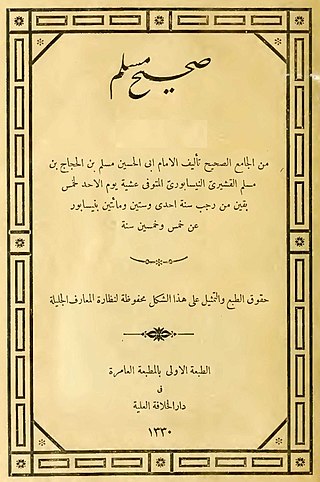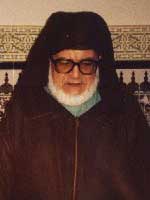External links
- Avoid Imitating the Kuffar [ permanent dead link ] by Ahmad bin al-Siddiq al-Ghumari
- Arabic Online Biography of the Ibn al-Siddiq family
| International | |
|---|---|
| National | |
| Other | |
Ahmad bin al-Siddiq al-Ghumari | |
|---|---|
| Personal | |
| Born | 26 December 1902 [1] |
| Died | 1961 Cairo, Egypt |
| Religion | Islam |
| Nationality | Moroccan |
| Denomination | Sunni |
| Jurisprudence | Shafi'i [2] [3] |
| Movement | Sufism |
Ahmad bin Muhammad bin al-Siddiq al-Ghumari (26 December 1902-1961) was a Muslim traditionist and scholar of Hadith from Morocco. [4]
Ghumari authored more than one hundred books. He was well known for a debate which acrimoniously began between him and fellow hadith scholar Muhammad Nasiruddin al-Albani, and later continued with Ghumari's younger brother Abdullah and Albani. [5]
Like the rest of his family, Ghumari was a leader of the Siddiqiyya Sufi order. [6] Muhammad Taqi-ud-Din al-Hilali claimed that al-Ghumari had chosen to live a very simple life and eschewed material excess. [7]
Although a practitioner of Sufism, Ghumari criticized some Sufis, especially the rival Naqshbandi order. [8] Like Ibn Hazm, Ghumari viewed scholarly differences of opinion as wrong and he often used harsh language when responding to intellectual opponents. [5] [8] Having originally followed the Maliki school of thought like most of Muslim scholarship in Morocco, al-Ghumari later switched to the Shafi'i school for a period and finally opted for absolute independent reasoning. [9] Unlike most of Moroccan scholarship, al-Ghumari opposed the Ash'ari school of theology. [10] Muhammad Abu Khubza, among other Moroccan scholars, also claim that al-Ghumari temporarily adhered to the Zaidiyyah school of Shia Islam. [10]

The Hanbali school or Hanbalism is one of the four major schools of Islamic jurisprudence within Sunni Islam. It is named after and based on the teachings of the 9th-century scholar, jurist and traditionist, Ahmad ibn Hanbal, and later institutionalized by his students. It is the smallest and most strictly traditionalist of the four major Sunni schools, the others being the Hanafi, Maliki and Shafi'i schools.

The Maliki school or Malikism is one of the four major schools of Islamic jurisprudence within Sunni Islam. It was founded by Malik ibn Anas in the 8th century. The Maliki school of jurisprudence relies on the Quran and hadiths as primary sources. Unlike other Islamic fiqhs, Maliki fiqh also considers the consensus of the people of Medina to be a valid source of Islamic law.
Abu Hanifa was a Sunni Muslim scholar, jurist, theologian, ascetic, and eponym of the Hanafi school of Islamic jurisprudence, which remains the most widely practiced to this day. His school predominates in Central Asia, Afghanistan, Iran, Turkey, the Balkans, Russia, Circassia, Pakistan, Bangladesh, India, and some parts of the Arab world.
Ahmad ibn Hanbal was a Sunni Muslim scholar, jurist, theologian, traditionist, ascetic and eponym of the Hanbali school of Islamic jurisprudence—one of the four major orthodox legal schools of Sunni Islam. The most highly influential and active scholar during his lifetime, Ibn Hanbal went on to become "one of the most venerated" intellectual figures in Islamic history, who has had a "profound influence affecting almost every area" of the traditionalist perspective within Sunni Islam. One of the foremost classical proponents of relying on scriptural sources as the basis for Sunni Islamic law and way of life, Ibn Hanbal compiled one of the most significant Sunni hadith collections, al-Musnad, which has continued to exercise considerable influence on the field of hadith studies up to the present time.

Sahih al-Bukhari is the first hadith collection of the Six Books of Islam. Compiled by Islamic scholar al-Bukhari in the musannaf format, the work is valued by Muslims, alongside Sahih Muslim, as the most authentic after the Qur'an.

Sahih Muslim is the second hadith collection of the Six Books of Sunni Islam. Compiled by Islamic scholar Muslim ibn al-Ḥajjāj in the musannaf format, the work is valued by Sunnis, alongside Sahih al-Bukhari, as the most important source for Islamic religion after the Qur'an.

Ahl-i-Hadith or Ahl-e-Hadith is a Salafi reform movement that emerged in North India in the mid-nineteenth century from the teachings of Sayyid Ahmad Shahid, Syed Nazeer Husain and Nawab Siddiq Hasan Khan. It is an offshoot of the 19th-century Indian Tariqah-i-Muhammadiya movement tied to the 18th-century traditions of Shah Waliullah Dehlawi and the Wahhabi movement. The adherents of the movement described themselves variously as "Muwahideen" and as "Ahl e-Hadith."
Shams ad-Dīn adh-Dhahabī, also known as Shams ad-Dīn Abū ʿAbdillāh Muḥammad ibn Aḥmad ibn ʿUthmān ibn Qāymāẓ ibn ʿAbdillāh at-Turkumānī al-Fāriqī ad-Dimashqī was an Athari theologian, Islamic historian and Hadith scholar.
Abū Hurayra ʿAbd al-Raḥmān ibn Ṣakhr al-Dawsī al-Zahrānī, commonly known as Abū Hurayra, was a companion of the Islamic prophet Muhammad and the most prolific hadith narrator in Sunni Islam.
Muhammad Nasir al-Din, known by his nisbaal-Albani, was an Albanian Islamic scholar known for being a famous muhaddith. A major figure of the Salafi methodology of Islam, he established his reputation in Syria, where his family had moved and where he was educated as a child.

Dhia' ul-Dīn 'Abd al-Malik ibn Yūsuf al-Juwaynī al-Shafi'ī was a Persian Sunni scholar famous for being the foremost leading jurisconsult, legal theoretician and Islamic theologian of his time. His name is commonly abbreviated as al-Juwayni; he is also commonly referred to as Imam al-Haramayn meaning "leading master of the two holy cities", that is, Mecca and Medina. He acquired the status of a mujtahid in the field of fiqh and usul al-fiqh. Highly celebrated as one of the most important and influential thinkers in the Shafi'i school of orthodox Sunni jurisprudence, he was considered as the virtual second founder of the Shafi'i school, after its first founder Imam al-Shafi'i. He was also considered a major figurehead within the Ash'ari school of theology where he was ranked equal to the founder, Imam al-Ash'ari. He was given the honorific titles of Shaykh of Islam, The Glory of Islam, The Absolute Imam of all Imams.
Abū Bakr Aḥmad ibn ʿAlī ibn Thābit ibn Aḥmad ibn Māhdī al-Shāfiʿī, commonly known as al-Khaṭīb al-Baghdādī or "the lecturer from Baghdad", was a Sunni Muslim scholar known for being one of the foremost leading hadith scholars and historians at his time. He is widely considered an important authority in hadith, fiqh and history.
Muhammad Zahid Hasan, commonly known by the nisbaal-Kawthari, was an Islamic scholar and theologian. A prolific author of over 40 works, al-Kawthari followed the Hanafi school of jurisprudence and championed the Maturidi school of theology.
Rabīʿ bin Hādī ʿUmayr al Madkhalī is a Saudi professor who is a former head of the Sunnah Studies Department at the Islamic University of Madinah. He is a Salafi Muslim scholar who is considered to be one of Salafism's prominent thinkers. He was most active in the 90’s and early 2000s where he received praise from other Salafi scholars like Shaykh Salih Ibn Uthaymeen and Shaykh Abdul Aziz Bin Baz. Another prominent Salafi scholar named Imam Al-Albani labelled him the Imam of Jarh Wa Tad’il, which he himself later rejected.

Al-Ḥakīm al-Tirmidhī, full name Abu Abdallah Muhammad ibn Ali ibn al-Hasan ibn Bashir al-Tirmidhi was a Persian Sunni jurist (faqih) and traditionist (muhaddith) of Khorasan, but is mostly remembered as one of the great early authors of Sufism.

Abd al-Aziz bin Muhammad al-Ghumari was a Muslim scholar from Morocco.

Habib Umar bin Hafiz is a Yemeni Sunni and Sufi Islamic scholar, teacher, and founder and dean of Dar al-Mustafa Islamic seminary. He also a member of the Supreme Advisory Council for the Tabah Foundation in Abu Dhabi.
Abu al-Fadl Abdullah bin Muhammad bin al-Siddiq al-Ghumari was a Muslim preacher, scholar of hadith, jurist and theologian from Morocco.
Ḥassan al-Kettani is a Muslim scholar and former political prisoner from Morocco. Imprisoned for alleged connections to the 2003 Casablanca bombings, Kettani was pardoned by Mohammed VI eight years later after efforts by his lawyer and human rights groups, and the success of Islamists in Morocco's parliament. However many human rights groups have pointed at the fact that Shaykh Hasan was targeted due to the crackdown on Islamist scholars and activist, he was released in 2013 after years of torture and persecution.
Mohammed bin Ali bin Ibrahim Al-Shaybani Al-Bakri Al-Ahsa’i was an influential Shia Muslim scholar who adhered to the Ja'fari school of Islamic jurisprudence.